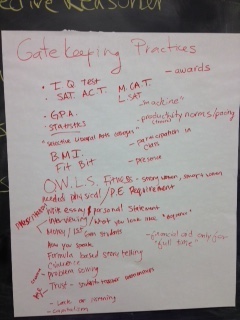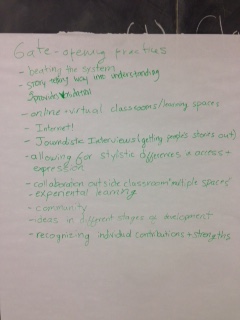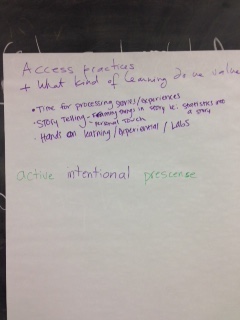Serendip is an independent site partnering with faculty at multiple colleges and universities around the world. Happy exploring!
You are here
Home » The Hegemony of Normalcy and Reason
By amweiner
March 22, 2016 - 13:15
For me, there were two eye-opening moments during the documentary Invitation to Dance. First, when Simi Linton showed disability activism through using her two hands, one with open and one in a fist. The fist was the disabled community and the open hand represented all social constructs. She then says that doctors and organizations like Autism Speaks are focussing on 'fixing' the disabled population while activists are focussing on chaging social constructs. This simple representation provided tons of clarity for me. Secondly, there was a point when one of the dancers talked about how tdancing is not theraputic for them, it is art. When they dance, they want to be judged for the quality of their work not the 'niche' aspect of being in 'disabled dancers'.
February 18, 2016 - 23:55
By Chewy Charis
February 16, 2016 - 00:47
- Shock. Confusion. Denial. More shock. That was how I felt as I was reading the introduction on Normalcy. As a math lover, I have never thought that eugenics movement was in any way linked to math. I’ve never known that terms I am so familiar with, such as “normal curve,” “standard deviation,” “quartile,” and “ogive,” can be interpreted from a disability study’s point of view. Right after I read it, my initial response was something like “This person must be deliberately looking at math from a harsh angle; this is not the designer’s intention.” The fact this is my automatic response scares me—it’s like I’ve been programmed to think this way. Even when facts were pointed out to me, I refused to accept it. This makes me wonder: what happens to those who are never aware of this?
February 15, 2016 - 23:15
- I found it interesting that the two news articles used the experience of "white" American people. Although that these articles are useful in exploring how disability is discussed in society I think that it is important to not the racial concerns in disability. There are many other races/ethnicities with people with disabilities, but I don't think is discussed as much. There seems to be a racial disaparity in disabilities.
February 15, 2016 - 22:55
In looking at the readings for this week, I'm constantly reminded of what makes for a "suitable" member of the academy or not--and just how many prominent people in the history of the academy might be considered mad. Look even at so many of the Greek philosophers upon whose philosophies we rely were considered mad or "slandered" as being mad even in their own lifetimes!
February 15, 2016 - 21:58
Although I am obviously in favor of the revamped policies that inspired the 2010 Huffington Post article "More Intellectually Disabled Youths Go to College," I took issue with how little attention the article actually gave to Zach Neff, as well as the particular aspects of his persona that it did focus on. The article opens: "Zach Neff is all high-fives as he walks through his college campus in western Missouri. The 27-year-old with Down syndrome hugs most everybody, repeatedly. He tells teachers he loves them." Even though we are only one paragraph in, the stereotype of individuals with Down syndrome being overly loving (and unfailingly lovable) is already engrained into the mindsets of the readers.
February 12, 2016 - 13:41
The Disability Reader gave unprecedented context for understanding the word 'normal'. Historically, as the ideas of the average and the ideal converge, the creation of a hierarchical structure of normal is born. Normal and desired become relaitvely synonymous. We strive to be smart, looks beautiful, and conform to the gender identity society places upon us. Ironically, we have merged the ideal with the normal. Somehow, as time progressed, we expected ourselves to achieve the ideal becuase we perceived that to be possible. So who, yoiu may ask, lies at the bottom of this hierarchy? The 'deviants', 'undesireable', 'poor', and 'disabled'-- the Other. We have 'othered' all who deviate from the already unrealistic expectations of society. In doing so, we have dehumanized those poeple.
February 10, 2016 - 22:42
 WEEK FIVE: THE HEGEMONY OF NORMALCY AND REASON
WEEK FIVE: THE HEGEMONY OF NORMALCY AND REASON
This week I want you to think about how the institution of the selective liberal arts college measures and norms us to assess our fitness. Who has access to the institution, and who doesn't? Who is deemed most "fit" for this context? Who "fits in" and who doesn't?
1) Lennard J. Davis, "Introduction: Normality, Power, and Culture" in: The Disability Studies Reader (DSR, available as ebook and also in bookstore) (12 dense pages)








 WEEK FIVE: THE HEGEMONY OF NORMALCY AND REASON
WEEK FIVE: THE HEGEMONY OF NORMALCY AND REASON